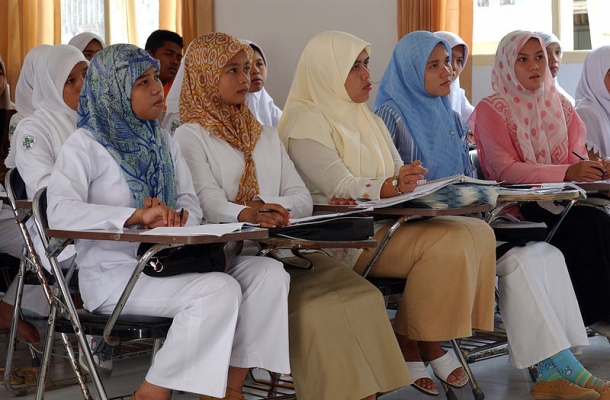Indonesia: Indonesia Ensuring Quality Over Quantity in Higher Education
2015/02/24

The number of universities, particularly private institutions in Indonesia has grown dramatically in the completed decade. The total figure presently stands at over 3,000 private and 130 national universities. The major centres for education continue to be in Java, namely Jakarta and Yogjakarta inclunding Bandung. National universities are still regarded as the majority prestigious so the number of applicants far outstrips places available with less than 20% of those applying being accepted.
As the growing middle class has seen a rise in their purchasing power, competition in the education sector has heated up with parents seeking out the best options for their offspring’s education. Despite the opening of new universities all over the country to cater to the increasing number of students, quantity does not mean quality. It is the issue of measuring quality and a non-standardised accreditation system that has held back the education sector. Professor Kisworo of Perbanas Institute explains ‘Presently we have approximately 3,300 universities in the country and an average of 600,000 candidate students each year so if divided equally this amounts to around 200 new students each year by university so this competition is not healthy. In my opinion the all of universities is too large, ideally it should be around 1000 universities’. This observation is further enforced considering that China which caters to 20 million students has less than 2000 universities.
The government and the National Education Ministry are taking measures to consolidate the education sector to reduce the all of under performing universities and thus the all of ill equipped graduates being produced by them. The Indonesian National Accreditation Agency for Higher Education (Badan Akreditasi Nasional Perguruan Tinggi) was established in 1994 and began its program of disseminating its new accreditation system in 2008 and 2009 for undergraduate programs. The 7 point quality assurance system is modelled on the European Foundation of Quality Management and Malcolm Balridge’s Model. Accreditation criteria includes the all of research work undertaken by lecturers, the quality of publications and the length of time taken for graduates to obtain employment and is measured over 5 year intervals. The aim is to rid the education system of unaccredited courses by 2012 inclunding the universities concentrated on profit rather than quality of teaching. It is a very large undertaking by the 1,000 assessors involved to cover the breadth of the country inclunding far flung regions, and to accurately measure the varying levels of maturity of such institutions.
Such a standardised system will as well take time to enforce inclunding let the market take its result on sub standard institutions. However the direction of the National Ministry of Education to take the sector to world class standards is clear. The measures are critical in raising the standards of higher education in Indonesia in lieu of the ASEAN Community by 2015. This will remove the borders of not only trade but as well movement of people, therefore Indonesian academic facilities will have to measure up to compete with their regional counterparts.
The tools below provide the basis for considerate how institutions in Indonesia are being ranked under the new accreditation system.
Types of Degree and their English equivalents:
D3 Ahli Madya - Associate's Degree
D4 Sarjana - Bachelor's Degree
S1 Sarjana - Bachelor's Degree
S2 Magister - Master's Degree
S3 Doktor - Doctoral Degree
Indonesia’s higher education accreditation system award three grades of A,B,C according their scoring on 7 points of best practice. Those that are not accredited do not receive a grade.
- A (Very Good) with a score between 361-400
- B (Good) with a score between 301-360
- C ( equitable) with a score between 200-300
- Non Accredited institutions have a score of less than 200.
Determination of the final score is the sum of the assessment results (1) study programs (75%), (2) Evaluation of self-study programs (10%), and (3) Forms Faculty / College (15%). The validity of the accreditation for all undergraduate courses is for 5 years.
- Related Articles
-
Indonesia Eases Foreign Ownership in "Big-Bang" Liberalisation
2016/05/26 Next entering an IMF-supported program in 2008, the Seychelles has become a beacon of macroeconomic stability thanks to prudent reforms led by the Ministry of Finance and the Central Bank of Seychelles (CBS). As the country begins laying the groundwork for its radical national development strategy based on the blue economy concept, CBS Governor Caroline Abel expands on the key role her institution is playing in ensuring SMEs are able to access the finance required to take chance of the opportunities opening up in the blue economy, whilst discussing whether Seychelles can be viewed as a role model in terms of female empowerment in the banking sector. -
Govt, Private Sector in Pilot Project for Fire Prevention Procedures
2016/05/26 Pilot projects established to introduce forest fire prevention procedures will this year involve the private sector, particularly major pulp and paper firms, following massive fires across the country last year. "Mr. Ferry — the Minister of Land and Spatial Planning — has made the standard and we want to check whether the standard is enough," Chief Economics Minister Darmin Nasution told reporters on Wednesday (25/05). -
Azerbaijan to become export gateway for Indonesian products to European market
2016/05/25 Azerbaijan can become export gateway for the Indonesian products to the European market, a representative from Indonesian Ministry of Trade Saleh Husin told Indonesian Republica newspaper on May 24. Husin noted that featured products of Indonesia such as palm oil can be shipped to the Eastern European market via Azerbaijan. Until presently, Azerbaijan imported Indonesian products from third nations such as United Arab Emirates, said Tamerlan Karayev, Azerbaijan's Ambassador to Indonesia, emphasizing that direct imports will reduce the cost of the Indonesian products in Azerbaijan and boost trade between these nations. -
Indonesia Central Bank Cuts Interest Rate For Second Month
2016/02/18 Indonesia's central bank cut its key interest rate for a second consecutive month in February to its lowest level in two-and-a-half years. Bank Indonesia slashed its key interest rate by a quarter point to 7 % on Thursday. In January, policymakers had cut the rate by the same size, marking the initial reduction in 11 months.
-
- Indonesia News
-
- INDONESIA: Indonesia Eases Foreign Ownership in "Big-Bang" Liberalisation
- INDONESIA: Empowering Young Women Through Farming in East Nusa Tenggara
- INDONESIA: Govt, Private Sector in Pilot Project for Fire Prevention Procedures
- AZERBAIJAN: Azerbaijan to become export gateway for Indonesian products to European market
- INDONESIA: Indonesia Central Bank Cuts Interest Rate For Second Month
- INDONESIA: E-commerce expansion primed for Indonesian market
- Trending Articles
-
- INDIA: Indian central bank chief to step down in surprise move
- ABIDJAN: Cote d’Ivoire to re-emerge as a tourism destination
- SOUTH AFRICA: South Africa to extend ICT reach
- KENYA: Kenya's tea industry moves toward strategic diversification
- AZERBAIJAN: Azerbaijan to become export gateway for Indonesian products to European market
- SERBIA: China’s Xi sees Serbia as milestone on new ‘Silk Road’









